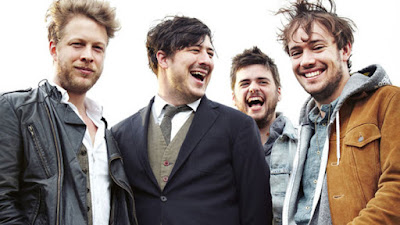War Horse
Last night I went with my community to see the stage production of "War Horse" at the Princess of Wales Theatre in Toronto. About once a year we go together to see a live drama, and this year it was to this six Tony-award winning (2011) play about friendship between an English farm boy and a horse during the years of the First World War.
Most reviewers have already said what every audience member soon discovers: that the technical achievement of the play is mesmerizing. This is true -- the Handspring Puppet Company, which designed the larger-than-life horses, was given a special award at the Tonys. The models, each of which are operated by three people at all times, are uncannily life-like in their movement, from every twitching ear to their equestrian trot. They are veritable characters in the story. This may, however, also be the show's weakness. It's hard to suspend disbelief when one is being impressed by the puppeteers, whom you can see at all times (they are even costumed in period clothes). So during a private scene between the horse and his boy, there are actually four humans in the picture on-stage.
The story is also drippingly sentimental -- siroposo, as we scholastics once neologized in Venezuela. It becomes a bit thick during the boy's prolonged and agonized yearning for his horse on the battlefields, while apparently oblivious to the human suffering around him. The show made some attempts to balance this, with at least two characters pointing out that thousands of men were dying horribly in the war, and all the boy could think about was his bloody horse (I often felt the same). Yet in the end, I suppose, the horse represents friendship (as did the Black Stallion franchise of the 1980s), which perhaps in the dehumanized wartime setting was his only lifeline to sanity.
 |
| A 1970s French rock album. |
Note: some spoilers in the next paragraph.
The play was strong, however, when it sought to portray the shock and horror of the clash between nature and the machine. This was the last war in which cavalry was used widely in action, although by the war's end, horses were relegated to supporting tasks like hauling supplies and the wounded. One figure said 250,000 horses were killed on the battlefields of France. Several scenes were designed to maximize the emotional impact of the clash: one powerful visual showed a slow-motion cavalry charge facing a barrage of machine gun fire. Another had a full-size tank chasing a horse off the stage. The horse, a symbol of natural freedom and beauty, was clearly out of place and overpowered in that mechanized hell; it had been unfairly coerced into the role of functionalized cog in the modern war machine.
In the end, the show is a solid artistic response to the tyranny of technocracy. It is a critique of war, of course, but war in any form has always been something like a machine. This play shows in stark terms how the early 20th century saw the elevation of the mechanical to new levels of deterministic and cultural force. It echos Jacques Ellul's fear about the effects of "technological society" for the natural and the human:
The network of all the machines – those in the factories, those used for transport, those used in offices, those used for entertainment, those having to do with food, sanitation, and communication – causes the whole society to be modified – scale of values, processes of judgement, customs, and manners – and creates a situation in which there is no exact center where man can pretend to lay his hand on the machine (which machine?) in complete independence and utilize it as he sees fit! If man does utilize the machine, it is within a society that has already been modified, nay transformed, by the machine without reference to the will or decision of man.As a spectacle, War Horse is first-class. As a story it is light-weight, but as a fable it is strong. In the end, it is a tale of separation and reunion, of "heart" over human folly and pride, and of love having the final word over death.




Comments
Post a Comment